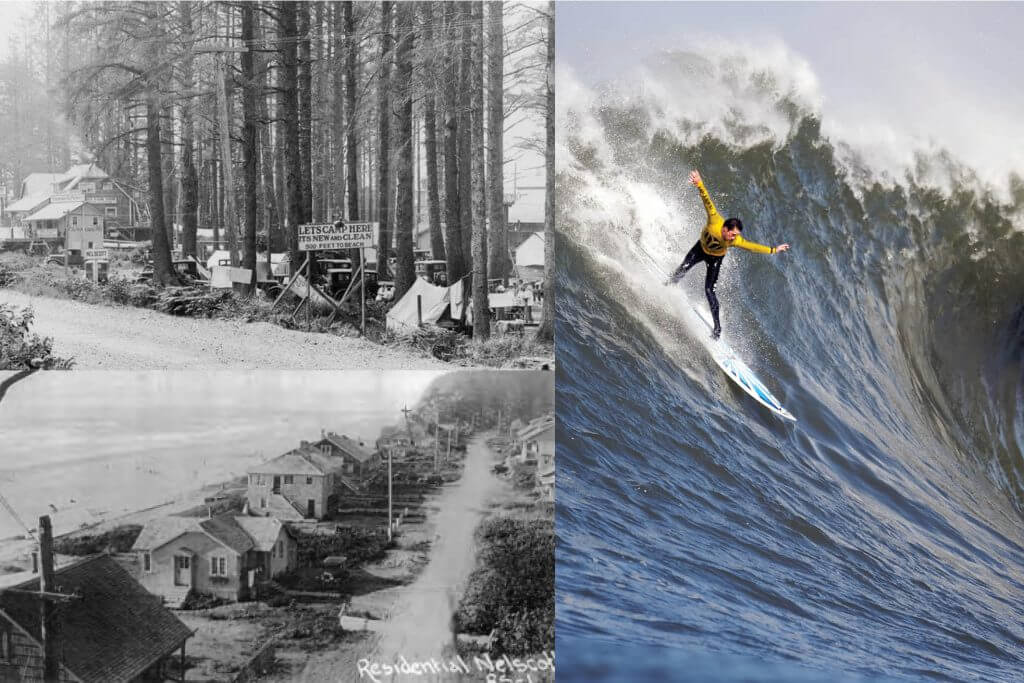Lincoln City Oregon: Nelscott
Lincoln City was originally five small communities. This is the final article in our series regarding the roots of Lincoln City and explores Nelscott and its intriguing history.
The Early Days
Early Nelcott was remote and densely forested with spruce and hemlock. The Dawes Act of 1887 provided free land to new colonists and Siletz tribal members, but few took the government up on their offer.
Among the adventurous were Charles P. Nelson and Dr. W.G. Scott, developers looking for land in the early 1900s. Nelson first came to see the area around 1906 and the two men later returned to buy. Many parcels of relatively flat land with beach access offered development promise. The two men combined surnames and formed a new partnership firm: the Nelscott Land Company.
The area remained mostly inaccessible until the construction of the Roosevelt Military Highway (Highway 101) in the 1920s.
Automobiles Changed Everything
Automobiles were affordable by the 1920s and travelers found the drive down the new Oregon Coast Highway almost irresistible. Suddenly, motoring tourists flocked to the area in droves and an economic boom ensued in the area.
Nelscott’s development was relatively small compared to others along the coast. The Nelscott Land Company subdivided their property into 87 small lots for small vacation cottages. The company wanted to create a small summer resort town, not a massive development.
Scott and Nelson wanted a wholesome environment for visitors. They outlawed public halls and taverns and the community operated on coal oil lamps. Even when a diesel-powered generator arrived on the property in 1926, it was shut down at ten o’clock every night.
Early Nelscott catered to motorists and tried to entice campers to the area. The Nelscott Auto Park was basically an elaborate campground, which accommodated 100 tent campers at the height of the automobile craze. It offered tent houses for fifty cents a day.
The Nelscott Cash Store built in 1927 had a general store, bus depot, gas station, and restaurant. It was so busy during the summer that six clerks sometimes staffed the store. Photos of the auto park and store are courtesy of the North Lincoln County Historical Museum.
Eventually, travelers wearied of camping in tents and business owners offered cabins instead. Modern private cabins rented for $1.50 to $3.50 per day completely furnished and with hot and cold showers. Visitors could also partake in pony rides, Friday night entertainment, and church services.
The Great Depression and World War II eventually brought tourism to a halt. Blackouts after sundown, rationing, and the migration to the coast for employment stunted growth during these periods of uncertainty.
Nelcott Becomes Lincoln City
Despite these hardships, people remained in the area. However, the rise in modern hotels and new state parks meant few people stayed in tourist cottages or tents. A 1939 directory recorded only seventy-one residents and by 1950 there were just 180.
Nelscott never incorporated and when given the option to amalgamate with Oceanlake, DeLake, Cutler City, and Taft, residents voted 85 in favor and 57 against. In 1964, all five communities became Lincoln City for improved fire, water, and sewage services.
Nelscott Today
You can find the Nelscott area north of Spanish Head. Fashionable beach houses line the coast and the Nelscott Strip offers shops and diners.
Nelscott is most well-known for its stunning beaches and the Nelscott Reef, home to world-class big wave surfing competitions. It was named as one of the Pacific’s best surf locations in Surfer Magazine in 2003, and home to the Nelscott Reef Big Wave Pro-Am in Lincoln City.
*****
If you’re interested in exploring historic Nelscott, why not stay in a comfortable Lincoln City oceanfront vacation home with stunning ocean views and high-end amenities. These well-appointed condominiums offer stunning ocean views, HDTV, wireless internet, an exercise room, a heated indoor pool and a games room, and more.
You’re perfectly positioned to explore the Pacific Coast Scenic Byway and all the Oregon Coast has to offer, without sacrificing comfort or affordability.
Posted on 06/15/2017 in Lincoln City


